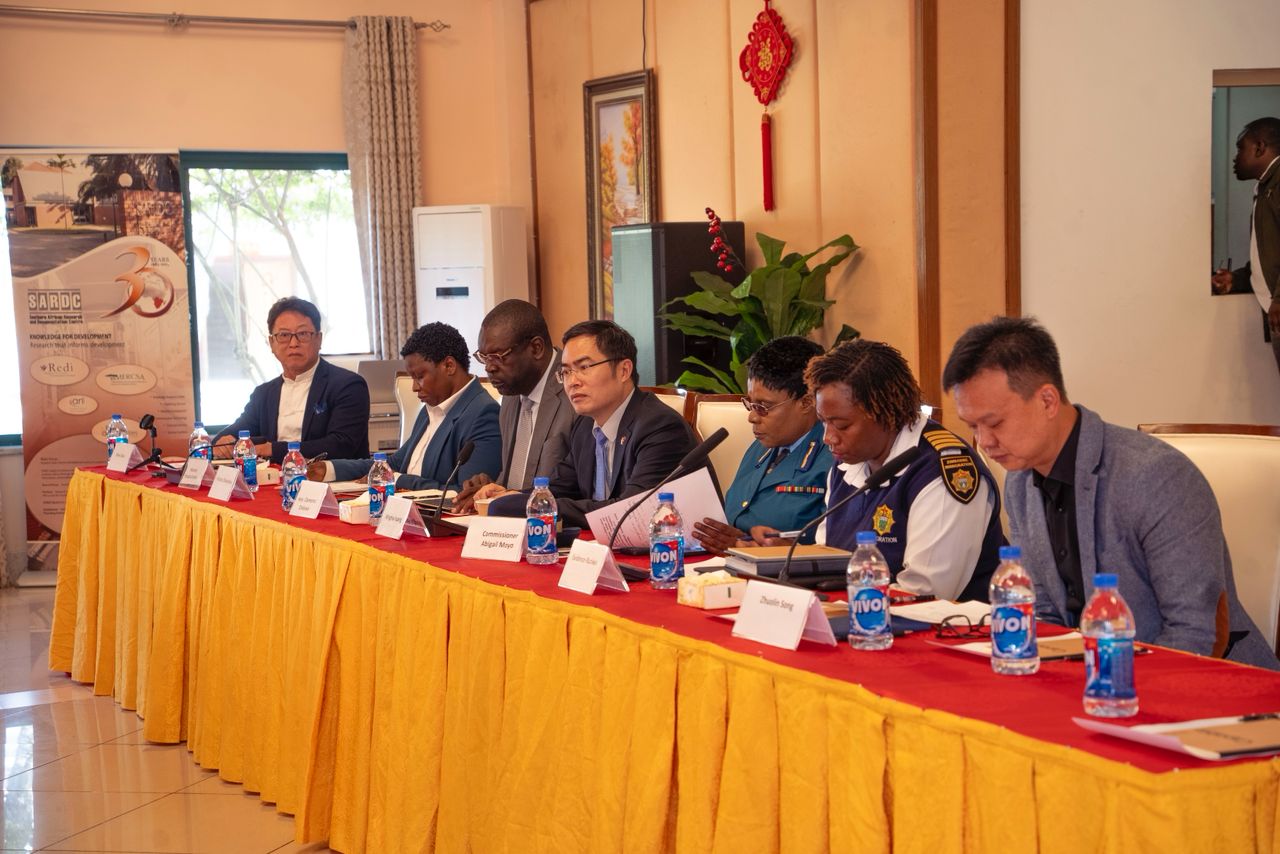By Beaven Dhliwayo, Group Features Editor
ZIMBABWE and China are strengthening their economic partnership through comprehensive digital reforms and intensified security cooperation, as Beijing continues to dominate foreign investment inflows into the Southern African nation.
At a high-level roundtable held Thursday at the Golden Peacock Villa Hotel in Harare, senior government officials, security chiefs, and business leaders gathered to examine the future of Zimbabwe-China economic cooperation amid a shifting investment landscape.
Organised by the Southern African Research and Documentation Centre (SARDC) and the China-Zimbabwe Exchange Centre (CZEC), the meeting offered a candid appraisal of both the strides and setbacks shaping one of Africa’s most consequential bilateral relationships.
According to the Zimbabwe Investment and Development Agency (ZIDA), Chinese firms accounted for more than 60 percent of all foreign investment approvals in 2024, with 441 licenses issued, amounting to over US$2.7 billion in projected inflows.
“We’ve ushered in a new era of digital facilitation,” said Silibaziso Chinzwina, ZIDA’s Chief Investment Promotions Officer.
“Gone are the days of paperwork and month-long waits. Our DIY Investor Portal now processes investment licences in just five days—down from 21.”
The automation initiative, launched in late 2024, is part of a broader government effort to streamline bureaucracy and boost investor confidence.
Yet Chinzwina acknowledged that digital progress alone will not fix deeper structural issues.
“Power shortages, foreign currency volatility, and regulatory ambiguity still deter long-term capital,” she said, citing recent audits showing only 21 percent compliance with national social security requirements and 8 percent tax delinquency among registered investors.
“A new Single Window Platform—expected to launch in the coming months—aims to consolidate all government-to-business services into one unified digital interface,” added Chinzwina.
On the security front, Zimbabwe Republic Police (ZRP) Commissioner Abigail Moyo underscored the importance of a stable legal environment in safeguarding foreign capital.
“Our role is to protect legitimate business activity while enforcing compliance with Zimbabwean law,” Moyo said.
Her comments followed reports of abuse of investor permits through so-called “residence of convenience” schemes, where foreign nationals acquire legal status via minimal stakes in local companies.
Immigration authorities also weighed in.
“While 30-day business visas are readily issued at ports of entry, any extension requires strict documentation,” said Evidence Ruziwa, spokesperson for the Department of Immigration Control.
“Overstaying remains the most common violation. We urge all visitors to respect our national laws.”
The forum also served as a platform to discuss the broader geopolitical implications of China’s presence in Zimbabwe.
SARDC Executive Director Munetsi Madakufamba situated current developments within the framework of the Belt and Road Initiative and the African Union’s Agenda 2063.
“This isn’t just about funding or infrastructure—it’s about shaping industrial ecosystems,” he said.
“We’re seeing transformative projects like the Dinson Iron and Steel Plant, which don’t just create jobs, but transfer skills and deepen regional supply chains.”
Madakufamba warned, however, that success hinges on execution.
“Perception remains one of our toughest challenges,” he said.
“Our policies are encouraging, but unless implementation is consistent, investor trust will falter.”
He called for a pivot from primary resource extraction to local beneficiation and manufacturing.
“The real value is created when Chinese firms build production lines here, turning raw materials into finished goods within our borders.”
Chinese Counsellor Huang Minghai reaffirmed Beijing’s strategic interest in Zimbabwe, citing the RMB360 billion committed to African development under the 2024 Forum on China-Africa Cooperation (FOCAC).
“Zimbabwe’s reform trajectory aligns closely with our development vision,” he said.
But in private, some business executives expressed impatience over continued red tape, delayed permit approvals, and inconsistencies in regulatory interpretation.
Zanu-PF’s Director for Economic Affairs, Anastancia Ndhlovu, struck a conciliatory tone.
“We hear these concerns and acknowledge that further structural reforms are necessary,” she said.
A representative from China’s private sector echoed that call.
“We need clarity and speed—especially around licensing and compliance procedures,” they said.
The mood at the forum was cautiously optimistic.
Zimbabwe’s digital leap has streamlined entry for investors, and its security apparatus appears aligned to create a business-friendly environment.
But stakeholders agreed that the next phase of the bilateral relationship must be built on execution, accountability, and genuine economic transformation.
“Trust is not built overnight,” Commissioner Moyo said in closing. “It is earned through transparency, consistency, and shared benefit.”
As Zimbabwe seeks to harness Chinese capital to fuel its Vision 2030 ambitions, both countries face the challenge of translating grand pledges into concrete gains, one investment at a time.




